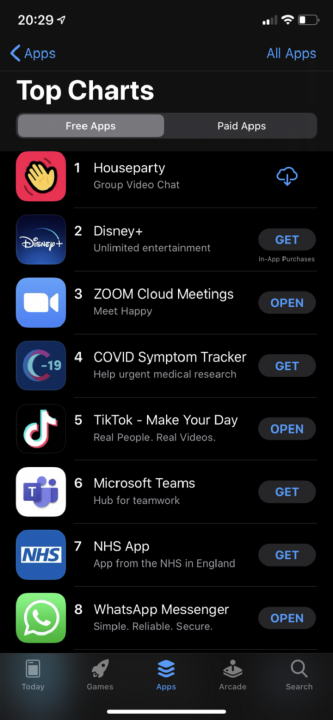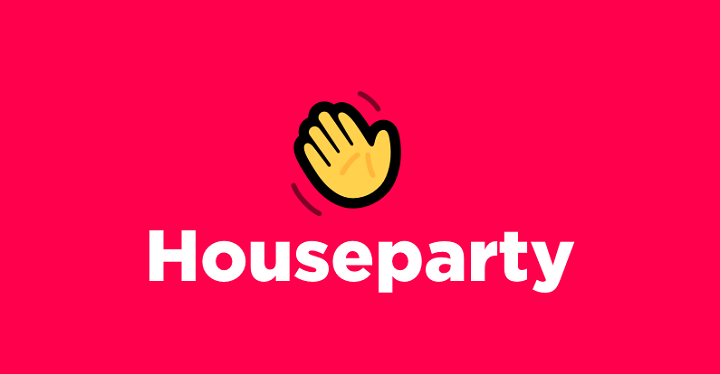
Now that literal house parties are essentially forbidden due to the coronavirus lockdown, millions of people worldwide have been downloading the Houseparty smartphone app for a virtual version of one.
According to data firm Apptopia, the app’s downloads surged from an average of 130,000 a week in February to more than two million a week in March.
But this week, users have complained of hackers using Houseparty to access their Paypal, Spotify, Netflix and even bank accounts, with a substantial amount of people subsequently deleting it in fear.
Houseparty yesterday tweeted that it is investigating claims that the hacking rumours were started to commercially harm the app, and it is offering a $1m (£810,000) bounty reward for proof of such a campaign.
We are investigating indications that the recent hacking rumors were spread by a paid commercial smear campaign to harm Houseparty. We are offering a $1,000,000 bounty for the first individual to provide proof of such a campaign to bounty@houseparty.com.
— Houseparty (@houseparty) March 31, 2020
A spokeswoman for the service said: “We've found no evidence to suggest a link between Houseparty and the compromises of other unrelated accounts.
"As a general rule, we suggest all users choose strong passwords when creating online accounts on any platform.
"Use a unique password for each account and use a password generator or password manager to keep track of passwords, rather than using passwords that are short and simple."
Is it safe to use?
The simple answer is - yes - if you take online precautions with your passwords, as you should be doing for any online accounts you have.
Like most social networking apps, creating an account for Houseparty is very straightforward.
When signing up, the app asks for your phone number and permission to access your camera, microphone and location. It also asks for permission to access your contacts and social media contacts.
RELATED: Wayne Denner's 5 CyberScams to watch out for
Northern Ireland-based cybersecurity expert Wayne Denner said: “You know you don’t have to give them all of this. Right?”
He also recommends that users should never use the same password more than once when creating an online account, signing up to social media platforms or registering on apps.
He added: “If you are ever worried about someone else gaining access to your account or someone who might have gained access to an account you own – always change the password right away.
“In addition, enable 2-factor authentication (2FA) on sites wherever it is available.”

Cybersecurity and online safety expert, Wayne Denner
Wayne advised that people do not need to delete the app, but need to be more careful when choosing their online passwords: “The best thing at the moment is making people aware of what the platform is, how it works and how to stay safer when using it.”
In relation to the safety of Houseparty with children and teenagers, he said: “As always, encouraging regular conversation is key when it comes to online safety.
“Parents should encourage their children who use the Houseparty app to keep their location private, be respective and mindful of what they are sharing and posting to within the app, and that someone taking a screenshot of content is a real possibility.
“Encourage them to leave a Houseparty room if a stranger enters (as all chats are unmoderated) and keep chats private by using the ‘lock mode’ on Houseparty.”
RELATED: Scammers are using coronavirus fears to access your data
Jack Moore, a cybersecurity specialist at online security firm ESET said these hacking claims would be reputationally “catastrophic” for the service but he too feels there is no need to delete the app, and added:
“What this has done is shone a light on the privacy policy in the app and there seems to be quite a lot of personal data that the app pulls from each device that is used - such as device ID, internet history and other actions taken through the service.”
How does it actually work?
The app itself has been around for quite a while and was previously mostly popular with kids and pre-teens. As of Sunday 29 March 2020, it was iTunes’ number one most downloaded free app.

It was created and is owned by Epic Games, the same manufacturer of popular console game Fortnite and is rated as 12+ in the app store.
The app is essentially a live face-to-face video call with its main appeal – but also main concern – being how simple it is to start chatting.
Once a user opens the app, a notification is sent to all their ‘friends’ that they are ‘in the house’ and then fellow users can pop up at any time, whether it is warranted or not – unless one of the users ‘locks the room’.
Within the room, users can chat with up to eight people simultaneously, and can also text and play virtual games together.
‘Friends’ are mainly derived from a user’s list of phone contacts, Facebook friends or Snapchat connections that can automatically be synced with the Houseparty app upon signing up.
The app will also show you who out of these people has already installed the app, and when a connection from any of these platforms newly downloads Houseparty, you will be notified of this too.
RELATED: Tech Craic: Acronis' Candid Wueest - Cybersecurity and Coronavirus
Having someone’s phone number and being connected to them on Facebook is one thing; how would you feel if they were able to instantly pop up on camera and visibly see you any time you open up the Houseparty app?
Houseparty also encourages conversations between the friends of friends. On the app’s homepage you can see the names of who is in a room with one of your ‘friends’. Even if those people aren’t your ‘friends’, you can then easily connect with them.
Users can tap a cartoon emoji of a waving hand to ‘say hi’ to anyone and can click the phone call emoji to video call. You will also be notified by push notification to your phone if someone is doing this to your username.
It’s important to note that you do not have to add every person you know, as this will increase the risk of them randomly jumping into your Houseparty chats, and you can deny friend requests.
 (c) Houseparty app
(c) Houseparty app
By holding the app icon down on Android or iOS phones, a "Sneak in" option will appear. Selecting this will prevent a push notification going to all your ‘friends’ letting them know you are available to be randomly popped up to.
You can also stop individual people from receiving this notification by ‘ghosting’ them; select the person's username, tap the settings icon (represented by a cog), and switch on ‘Ghosting’.
The app has another feature called ‘Facemail’. This is like a typical voicemail but instead of just audio you can attach a video which left for your chosen ‘friends’ to see the next time they login to Houseparty.
There is always the option of disabling the camera feature, preventing any unwanted people popping up and seeing your unsuspecting face staring back at them.
RELATED: Northern Irish scam-buster shuts down Indian scam call centre
Deleting Houseparty
If you do still wish to delete the app and you have an iPhone, instructions are as follows:
As of publication, there is no direct way to delete the Houseparty app on Android. You will need to email support@houseparty.com to request for your account to be deleted and you should also ask for your personal details (e-mail address, profile picture and phone number) to be removed from the app.
RELATED: Ofcom given new social media powers to further protect children online